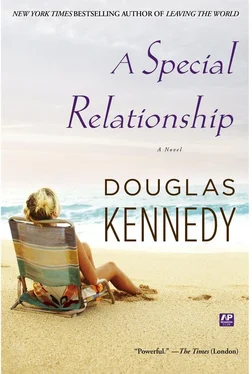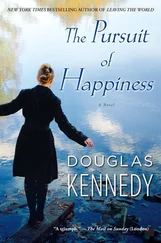Ellen favoured long, capacious skirts and big baggy linen shirts. She was in her early fifties - and from her style, her long grey hair, and her taste in sub-continent bangles, I sensed that there was a touch of the subculture veteran about her. But when it came to dealing with the complexities of my condition, she was reassuringly practical.
'You've switched countries, you've put your career on hold, you've become a mother, while all the time trying to adjust to married life with a man about whom you're frequently uncertain... and that's before we factor in the fact that the birth of your child was a difficult experience for yourself and for him. Now, when you add up all that, can you really sit there and tell me you think you're making too big a deal about all this?'
'I just feel so... I don't know... inadequate'.
'In what way?'
'Every way'.
If our conversations had a general theme, it was this long-standing feeling of inadequacy - the perennial worry of the perennial B student (which I was throughout high school and college) who never felt she was achieving her potential... who was always just about 'all right' at everything, but could never excel. And it didn't matter that I had done time on a major newspaper, or had been a foreign correspondent, or had the reputation for being very confident on the professional front. In private, the doubts always loomed - and I kept wondering when I'd eventually be found out.
'But you never were "found out"', Ellen Cartwright said, 'because you were obviously very good at what you did'.
'You're just trying to make me feel better about myself'.
'Actually, you're right - I am trying to do that. You should feel positive about such accomplishments. I mean, the way you talk about the Boston Post, you make it sound like you were hired to work the till in some supermarket. Can't you see what you've already accomplished?'
'What I see', I said, 'is someone who threatened the life of her child'.
How I wanted to see things differently. But during the first two weeks on anti-depressants, I still felt sheer, absolute terror about even just looking in on Jack. I articulated this fear on a regular basis both to Ellen and to Dr Rodale. And when Tony danced around this question all I could say was, 'I just can't see him yet'.
After two or three times, Tony had the good sense to stop asking me that question - because it was so obvious that I couldn't handle it. He didn't even mention visiting Jack - though I knew that he poked his head into the children's ward every night that he came to see me.
But Dr Rodale remained as direct as ever - and seemed to be using my inability to see Jack like my initial inability to eat: a benchmark hurdle that, once crossed, would indicate a further return to stability... not to mention a sign that the anti-depressants were finally kicking in.
Certainly, I was beginning to feel a gradual undercurrent of... what? Calmness? Not exactly - as I could still suffer from episodes of extreme anxiety. Chemically induced bliss? Hardly - as I often had to lock myself up in the bathroom to sob uncontrollably. And as for the amelioration of guilt...
'So far, I would call your progress steady and encouraging', Dr Rodale said as I entered week three of the anti-depressants. 'You're eating, your moods seem steady, you're doing positive things like reading and listening to music...'
Yes, but appearances can be deceptive. Because, every morning, when I finally climbed out of my drug induced coma, the realization of where I was (and the reasons that had brought me here) came crashing in on me with desperate ferocity. It took the next dose of anti-depressants and a long private hour with Glenn Gould on my Discman to force me into a false sense of quietude.
From the outset of my admission to hospital, Sandy was phoning constantly - initially monitoring my progress (as I found out later) by talking to the nurses. She also spoke a few times with Tony. He managed to talk her out of coming to London after my admission to St Martin's, correctly telling her that I was in no fit condition for visitors. Then, when I was back in the land of the moderately functional, I told her that it wasn't the best moment for a transatlantic visit, hinting that I really didn't want her to see me in my current condition. The fact that her eldest son had just broken his wrist in a bicycle accident kept her on the other side of the pond... to my intense relief. But we still spoke daily. We agreed a specific hour (4pm in London/11 am in Boston - when she had a half-hour break from her morning teaching load), and she'd ring a pay phone in a Visitor's Room down the hall from where I was billeted. As it was outside visitors' hours, it was always empty. Both Ellen and Dr Rodale considered it an important part of my recovery to maintain close contact with family - so the phone was considered mine for that half-hour period every afternoon.
At first, Sandy sounded like she herself needed a course of anti-depressants - or so said Tony, who actually rang her in Boston to break the news about my hospital incarceration. Even when I finally started to speak with her, her anxiety was apparent and, comme d'habitude, she had spoken to every possible leading expert on postnatal depression in the Greater Boston area. Not only that, she'd also made contact with some heavyweight Professor of Pharmacology at Harvard Med, who gave her the low-down on my anti-depressant load ('It is absolutely the right dosage for you'). And she also established telephone contact with Dr Rodale ('Well, you are my only sister', she said, when I expressed a certain wariness about such interference), whom she also thought sounded like good news.
'Oh, she is', I said in one of our early phone calls. 'As long as you obey her every command'.
'Well, at least you didn't get sent down for shock treatment - which, I've found out, is a last-ditch solution over here'.
'They use it here too', I said, thinking about poor scrambled Agnes.
'Hey, that doctor's gotten you back to some sort of equilibrium'.
'I wouldn't go that far'.
'Believe me, from the stories I've heard' -
But I didn't want to hear such stories. I just wanted to be out of here.
'You're going to have to let them be the judge of that', Sandy said, surprising me with her 'the English doctors know right' stance. 'You're still fragile. I can hear it'.
Then, just to underscore the fragility of everything, word came back about Agnes. It was nearly three weeks since she'd checked herself out, and I'd had a variety of roommates since then - all short-term internees, and all of whom I treated with polite diffidence, using my Discman and assorted reading matter to keep my distance. I was also allowed to take a walk in the hospital grounds whenever I wanted to - so, once a day, I'd put on the street clothes that Tony had brought me and spend fifteen minutes walking around the inner courtyard of the hospital. It wasn't exactly the most aesthetically pleasing of spots - as it was a concrete quadrangle, with a patch of green in the middle, around which the hospital staff cadged a cigarette. While I made my daily circle around this grubby enclosure, I always found myself thinking how easy it would be for me to escape - even though I was here of my own alleged free will. In fact, I believed that Dr Rodale encouraged me to take this quotidian walk to enforce the fact that I wasn't a prisoner, and also to get me to accept the reasons why I'd ended up here. Because I'm certain that Ellen informed her of the escape fantasy I articulated regularly during several sessions.
'So what's this "escape fantasy"?' Ellen asked me when I first brought it up.
'It's simple, really', I said. 'I get dressed and go out for my walk around the courtyard. Instead, I leave the hospital and head for the nearest taxi rank. I arrive back at our house. I pack a bag. I grab my passport. I jump the tube to Heathrow. I buy a ticket on the first plane to Boston, New York, Washington, even Philadelphia - anywhere on the East Coast...'
Читать дальше












